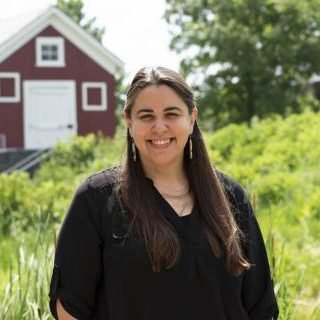Meet EPA Researcher Marie Schaefer, Ph.D.

Marie is an EPA social scientist researcher whose work focuses on how collaborations between Indigenous sciences and western sciences can contribute to sustainable futures. She has over a decade of experience working with Tribal nations across the U.S. on a wide range of climate change research projects and is of Anishinaabe (Odawa) and European settler descent. Currently, there are several projects with Tribal nation co-researchers Marie is collaborating on, including a climate adaptation plan and a cumulative impact assessment. She also continues to build reciprocal relationships with Tribal nations to understand their science priorities around climate change along with what barriers and opportunities there are for collaboration on those priorities.
Tell us about your background.
I received a Ph.D. in community sustainability from Michigan State University and a Master of Arts in applied cultural anthropology from Northern Arizona University where I worked for the Hopi Tribe’s Hopi Cultural Preservation Office.
When did you first know you wanted to work in environmental science?
In high school, I met some anthropologists at University of Michigan (I grew up in Ann Arbor, Michigan) and I started to become interested in community-based social science research as a career. My journey into climate change research started when I worked at the Sustainable Development Institute (SDI) at the College of Menominee Nation. The Menominee have their own theory of sustainable development based on their knowledge and SDI uses that theory to work on climate change among other issues with western science partners.
What do you like most about your job?
I like the welcoming and collaborative culture of EPA and that we are doing science that makes a difference. We work in very interdisciplinary and transdisciplinary teams. I really enjoy getting to know different types of sciences including doing the hard but important work of collaborations between Indigenous sciences and western sciences.
How does EPA science matter?
EPA science matters because it can have a very real impact on people’s lives. This is especially true for communities and Tribal nations that are not only on the frontlines of the impacts of climate change but also creating creative solutions to those impacts. The most impactful science has a foundation of co-created research based on reciprocal relationships.
If you weren’t a scientist, what would you be doing?
I would be doing something with books like running a used bookstore with a bakery in northern Michigan, community organizing, and traveling around the world.
What advice would you give a student interested in a career in science?
Find scientists that have a career that you are interested in and ask to do an informational interview with them. Most scientists are interested in trying to help the next generation. You might even get a wonderful mentor out of the conversation! During this informational interview, try to understand how those scientists got to where they are now. Then have as many internships, research assistantships or other experiences as possible that allow you to experience different types of careers you are interested in. Also, find out what networks and organizations are in the fields that you are interested in. Attend their annual meetings and conferences and join their professional organizations. Work to find or create spaces that you need. Through this process you will start to understand the landscape of the science you are interested in along with building up a network that will help you not only get a job but work on some of the most pressing issues of our time.
If you can have any superpower, what would you choose?
The ability to travel between places quickly and easily.
What do you think is our biggest scientific challenge in the next 20/50/100 years?
Climate change.
Editor's Note: The opinions expressed herein are those of the researcher alone. EPA does not endorse the opinions or positions expressed.
